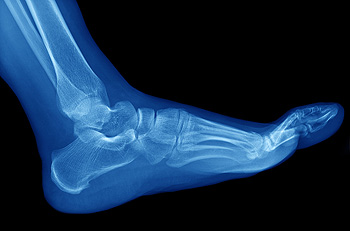Lansing (517) 321-1199

 The foot may appear deformed if a condition known as hammertoe occurs. When the toes bend at the joint and the top of the toe bends down, a claw-like or hammer formation is apparent. This is possibly caused by a predisposed inherited gene originating from having little or no arch in the foot, or if the second toe exceeds the length of the first toe. Additional causes of this condition may be attributed to shoes that fit poorly, often crowding the toes into a space that is extremely small. There are symptoms that are easily noticed that are associated with hammertoes, such as observing if your toe is curling, in addition to experiencing discomfort and pain when the toes are stretched. Possible prevention of this aliment may include choosing to wear the correct shoes that provide adequate room for the toes, and avoiding shoes that are too short or tight. Treatment is necessary to lessen the discomfort, which may typically consist of exercises being performed that can aid in strengthening the tendons in the toes, or stabilizing the toe by applying a splint. A consultation with a podiatrist is advised if you would like additional information and treatment options for hammertoe.
The foot may appear deformed if a condition known as hammertoe occurs. When the toes bend at the joint and the top of the toe bends down, a claw-like or hammer formation is apparent. This is possibly caused by a predisposed inherited gene originating from having little or no arch in the foot, or if the second toe exceeds the length of the first toe. Additional causes of this condition may be attributed to shoes that fit poorly, often crowding the toes into a space that is extremely small. There are symptoms that are easily noticed that are associated with hammertoes, such as observing if your toe is curling, in addition to experiencing discomfort and pain when the toes are stretched. Possible prevention of this aliment may include choosing to wear the correct shoes that provide adequate room for the toes, and avoiding shoes that are too short or tight. Treatment is necessary to lessen the discomfort, which may typically consist of exercises being performed that can aid in strengthening the tendons in the toes, or stabilizing the toe by applying a splint. A consultation with a podiatrist is advised if you would like additional information and treatment options for hammertoe.
Hammertoe
Hammertoes can be a painful condition to live with. For more information, contact Dr. Harold Sterling from Michigan. Our doctor will answer any of your foot- and ankle-related questions.
Hammertoe is a foot deformity that affects the joints of the second, third, fourth, or fifth toes of your feet. It is a painful foot condition in which these toes curl and arch up, which can often lead to pain when wearing footwear.
Symptoms
Causes
Genetics – People who are genetically predisposed to hammertoe are often more susceptible
Arthritis – Because arthritis affects the joints in your toes, further deformities stemming from arthritis can occur
Trauma – Direct trauma to the toes could potentially lead to hammertoe
Ill-fitting shoes – Undue pressure on the front of the toes from ill-fitting shoes can potentially lead to the development of hammertoe
Treatment
Orthotics – Custom made inserts can be used to help relieve pressure placed on the toes and therefore relieve some of the pain associated with it
Medications – Oral medications such as anti-inflammatories or NSAIDs could be used to treat the pain and inflammation hammertoes causes. Injections of corticosteroids are also sometimes used
Surgery – In more severe cases where the hammertoes have become more rigid, foot surgery is a potential option
If you have any questions please contact our office located in Lansing, MI. We offer the newest diagnostic and treatment technologies for all your foot and ankle needs.
Read more about What Are Hammertoes?